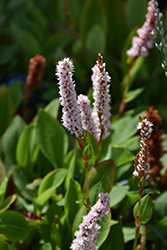It's all about ...
plants

Dimity Dwarf Fleeceflower
Persicaria affinis 'Dimity'
Plant Height: 6 inches
Flower Height: 10 inches
Spacing: 18 inches
Sunlight:
![]()
![]()
Hardiness Zone: 3a
Other Names: Lesser Knotweed, Snakeweed, Polygonum
Description:
This variety forms a spreading mat of deep green, leathery leaves that turn bronze-red in fall; short spikes of deep red flowers appear in summer, fading to soft pink; an excellent groundcover that tolerates light foot traffic
Ornamental Features
Dimity Dwarf Fleeceflower has masses of beautiful spikes of red flowers rising above the foliage from early to late summer, which are most effective when planted in groupings. Its pointy leaves are green in colour. As an added bonus, the foliage turns gorgeous shades of coppery-bronze and in the fall.
Landscape Attributes
Dimity Dwarf Fleeceflower is an herbaceous perennial with a ground-hugging habit of growth. Its medium texture blends into the garden, but can always be balanced by a couple of finer or coarser plants for an effective composition.
This plant will require occasional maintenance and upkeep, and is best cleaned up in early spring before it resumes active growth for the season. Deer don't particularly care for this plant and will usually leave it alone in favor of tastier treats. Gardeners should be aware of the following characteristic(s) that may warrant special consideration;
- Invasive
Dimity Dwarf Fleeceflower is recommended for the following landscape applications;
- Mass Planting
- Rock/Alpine Gardens
- Border Edging
- General Garden Use
- Groundcover
- Container Planting
Planting & Growing
Dimity Dwarf Fleeceflower will grow to be only 6 inches tall at maturity extending to 10 inches tall with the flowers, with a spread of 24 inches. When grown in masses or used as a bedding plant, individual plants should be spaced approximately 18 inches apart. Its foliage tends to remain low and dense right to the ground. It grows at a fast rate, and under ideal conditions can be expected to live for approximately 10 years. As an herbaceous perennial, this plant will usually die back to the crown each winter, and will regrow from the base each spring. Be careful not to disturb the crown in late winter when it may not be readily seen!
This plant does best in full sun to partial shade. It is very adaptable to both dry and moist locations, and should do just fine under typical garden conditions. It is considered to be drought-tolerant, and thus makes an ideal choice for a low-water garden or xeriscape application. It is not particular as to soil type or pH. It is highly tolerant of urban pollution and will even thrive in inner city environments. This is a selected variety of a species not originally from North America. It can be propagated by division; however, as a cultivated variety, be aware that it may be subject to certain restrictions or prohibitions on propagation.
Dimity Dwarf Fleeceflower is a fine choice for the garden, but it is also a good selection for planting in outdoor pots and containers. Because of its spreading habit of growth, it is ideally suited for use as a 'spiller' in the 'spiller-thriller-filler' container combination; plant it near the edges where it can spill gracefully over the pot. Note that when growing plants in outdoor containers and baskets, they may require more frequent waterings than they would in the yard or garden. Be aware that in our climate, most plants cannot be expected to survive the winter if left in containers outdoors, and this plant is no exception. Contact our experts for more information on how to protect it over the winter months.
